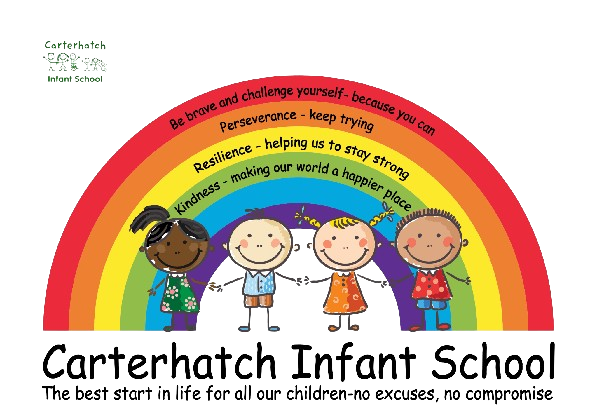Music
Music at Carterhatch
The exploration and enjoyment of music is an important part of the teaching and learning at Carterhatch Infant School.
Each year group studies the national curriculum for music through varied opportunities such as ‘The Singing Partnership Festival’ .
Our young musicians have the opportunity to explore tuned and untuned percussion instruments from enabling environments. Children also experience the joy of African Drumming.
Singing around school
Singing is at the heart of the music curriculum. At Carterhatch Infant School, our children express themselves through:
- Charanga to support children develop skills in composition, vocabulary and creativity as well as using music to enhance learning across the curriculum.
- Performances (carol concert, singing festival, singing at our local residential home).
- Weekly singing sessions designated to learning a bank of different songs that the children can forever cherish.
- Recorder Club (Year 2 – Summer 2022)
- Cross-curricular links (times tables songs, performance poetry, nursery rhymes).
The EYFS framework is structured very differently to the national curriculum as it is organised across seven areas of learning rather than subject areas.
3 and 4 year olds should be learning to:
- Sing a large repertoire of songs
- Listen with increased attention to sounds.
- Respond to what they have heard, expressing their thoughts and feelings.
- Remember and sing entire songs.
- Sing the pitch of a tone sung by another person (‘pitch match’).
- Sing the melodic shape (moving melody, such as up and down, down and up) of familiar songs.
- Create their own songs, or improvise a song around one they know.
- Play instruments with increasing control to express their feelings and ideas
Reception children should be learning to:
- Listen carefully to rhymes and songs, paying attention to how they sound.
- Learn rhymes, poems and songs
- Explore, use and refine a variety of artistic effects to express their ideas and feelings.
- Return to and build on their previous learning, refining ideas and developing their ability to represent them.
- Create collaboratively, sharing ideas, resources and skills.
- Listen attentively, move to and talk about music, expressing their feelings and responses.
- Sing in a group or on their own, increasingly matching the pitch and following the melody.
- Explore and engage in music making and dance, performing solo or in groups.
The National curriculum states that primary music teaching for Key Stage 1 should include the following:
Children should be taught to:
- Use their voices expressively and creatively by singing songs and speaking chants and rhymes.
- Play tuned and untuned instruments musically.
- Listen with concentration and understanding to a range of high-quality live and recorded music.
- Experiment with, create, select and combine sounds using the interrelated dimensions of music.
